ADSactly Literature - Julian: the child who spoke of death
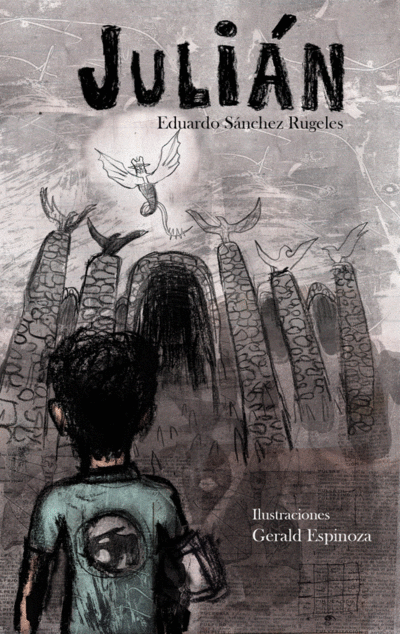
Julian: the child who spoke of death

Hello, readers of @adsactly.
Today I want to talk about a novel that I read recently and that touched me the last fiber of my heart. It is not one of those pink, easy, sweetened novels with happy endings. It is one of those novels that as you read, you catch, question, make you hate, love the characters, life. It is a novel in which you do not remain unshakable. Like any good literary work: it shakes you. That novel is called Julian.
Julián is a novel by the young and award-winning Venezuelan writer Eduardo Sánchez Rugeles, who with his novels Blue Label, Transilvania, unplugged and Ljubljana has won countless international awards. Julian is a novel about a child who is ill with cancer. The story is told in the first person, by Julian, who tells us everything that is happening around him. The childlike look is one of the most beautiful details that this novel has, since it is through the eyes of Julian, the way he perceives things, that we know them. We see his relationship with adults, but also the way he relates to his friends, who innocently devise a plan to rescue Julian from death, in the best style of Orpheus. Also, it is through his eyes that we know his feelings about his illness and possible death.
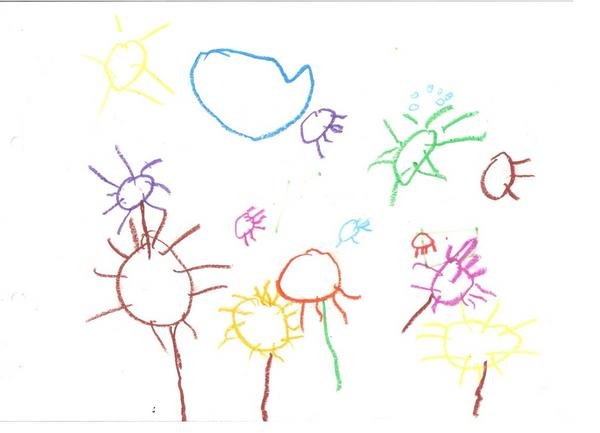
When we open the book we will find a series of drawings that Julian is supposedly doing to illustrate his adventures and events as if the novel were a diary. At first we can think that it will be an innocent story, but when we begin to read, we see the maturity, but also the naivety with which Julian, our main character, perceives sickness and death:
Eye of a cow was the first to tell me: "Is it true that you're going to die?" He asked during Physical Education class. "Everyone says you're going to die. It does not scare you?". "What thing?". "Die." "I do not know. I would have to ask an old man, people die when they're old. "
With this dialogue between our protagonist and his friend, we will perceive the frankness with which Julián's illness will be treated, but we will also see how naive and cruel children can be. Cow's eye does not intimidate him asking Julian about his illness and his imminent death and Julian, honest and inexperienced, says that only old people die. With this, we imagine that Julian has not thought about death as a possible event or at least he has not given much importance to his illness. Later, to one of his parents, Raúl, Julián asks him about where he will go when he dies and when he does not answer, he asks again:
"Raúl, you did not answer me." "What thing?". "What I asked you in the car. You can talk with me. I understand everything. Am I cursed? " "No, you're not cursed." "Ojo de Vaca says that cursed people go to hell. Am I going to hell? " "Dr. Bruno spoke of malignant cells, not cursed," he explained uncomfortably. "And it's not the same?". "Is no different".
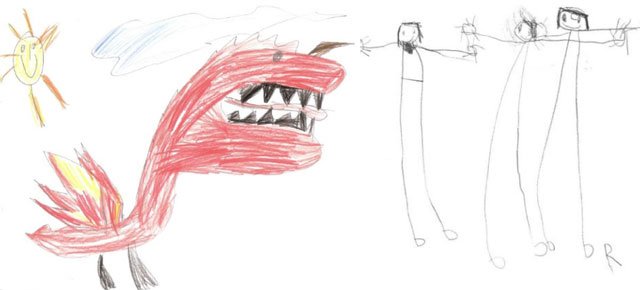
Beyond the confusion that Julian can have with the words cursed and malignant, we see the security and the calm with which he interpellates his father when he says that he understands everything, the courage and naturalness with which he asks, but we also notice the innocence that enclose their words when referring to hell as a place to which one goes after death. Here we can also see that it is Ojo de vaca, Julián's friend, who puts these ideas in the head of the sick child. Later it is Vanessa, the other friend, who asks:
"My mom told me you were sick. Is it true? "Vanessa asked. "If true". "What do you have? It hurts your belly?". "No, it's not the belly. It is something in the blood. It's bad. " "And you're not going to heal?" "I do not know, they say it's complicated." "And it hurts?" "What thing?". "The blood". "No, the blood does not hurt."
As well as this dialogue, we can find others where we can show the candidness of the children's characters, also the maturity with which they assume Julian's illness. But there is something that certifies the friendship, courage and ingenuity of the characters, it is precisely the plan that the three children have in order to save Julian from death: they update and revise the myth of Orpheus. The three children will look for the book that will instruct Vanessa to go down to hell and look for Julian without looking back.
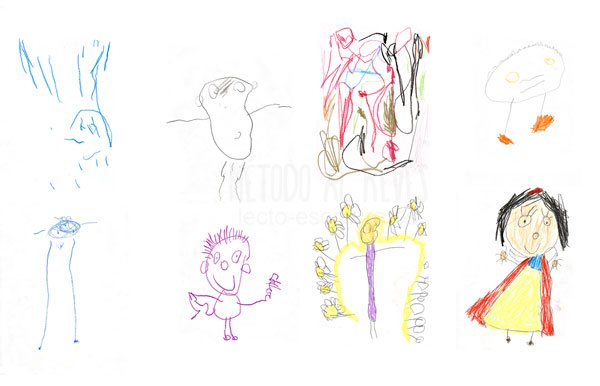
These three musketeers (Julián, Ojo de Vaca and Vanessa) embark on a path towards a new opportunity for Julián, a road full of moments of laughter, tears; a path of hope:
Everything made sense. When I died, Vanessa would come looking for me singing the song of Alejandra Guzmán, as Orfeo did ... I did not want what happened to Orfeo to happen to me. Before leaving, I think Vanessa realized my anguish. "Do not worry, Julian. I'm not going to get nervous like that man, I'll go out of the castle, walk, walk, walk and not turn around until I get to that pink mall. "
The children have made the plan according to their possibilities and their way of seeing the world, but although at first Julian is very excited, with the passing of months, the disease progresses and he, irremediably, loses the desire to save himself , even though he still believes in the myth of Orpheus. It is a kind of resignation, diminished will, which makes Julián look at illness and death as something definitive, but with a lot of maturity:
My hands and head hurt. The medicines make me very sleepy. I feel silly and tired, not wanting to play with Vanessa ... Vanessa is good. She says I have to rest to have strength on the trip back. But I do not want to go back. All the people I want, are no longer there, have left. I do not know how to tell Vanessa not to sing anything to me, to stay at home, to have no illusions about our meeting.
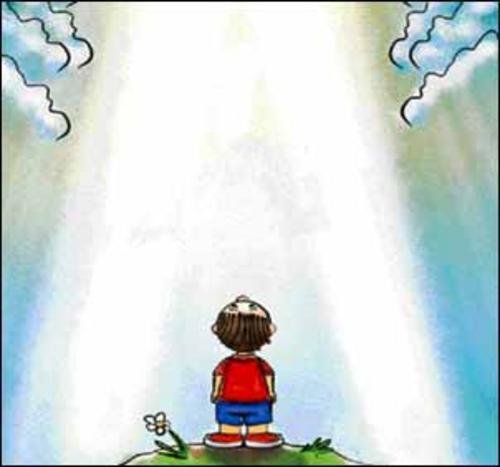
With this end of the novel, we understand that Julián has lost the illusion of continuing to live. We do not see that there is a sadness, if a rest, the security of wanting to leave and not return. With these final lines, we can understand that maturity does not come with age, Julián is a child that many adults should imitate. Talking about illness and death as if everything were a tale, not a fairy tale, but which in the end leaves us with lessons, may make the end more bearable and less sad. Julián is a wise and unforgettable child.
I hope you can read this novel and enjoy it as I do. I also remind you that you can vote for @adsactly as a witness and join our server in discord. See you next time with a smile. ;)

BIBLIOGRAPHICAL REFERENCE
Eduardo Sánchez Rugeles (2014). Julian. Editions B: Venezuela.
Written by: @nancybriti
Click on the coin to join our Discord Chat

Witness proposal is here:
Go To Steem Witness Page
In the bottom of the page type: adsactly-witness and press vote.

Use small letters and no "@" sign. Or, click here to vote directly!
Thank you!
very inspiring story
When reading your post I feel insinuated. As we are much older, we still have to read a lot of signs of nature that are in us and around us. we are still far from adults, even though we are old. Maturity is not determined by the length of life, but how to address life's problems wisely. I can even be suspicious, lest Julian is an adult who is trapped in the bodies of children. but then I got rid of it because I saw how the struggle against death was not as a suffering that would continue. He became aware that the moment of death was a time when he had to start living with a new plot.
many lessons that we can take from this post.
Thank you @nancybriti
Thank you @adsactly
thank you Steemit
Warm regard from Indonesia
Hi, @adsactly!
You just got a 0.29% upvote from SteemPlus!
To get higher upvotes, earn more SteemPlus Points (SPP). On your Steemit wallet, check your SPP balance and click on "How to earn SPP?" to find out all the ways to earn.
If you're not using SteemPlus yet, please check our last posts in here to see the many ways in which SteemPlus can improve your Steem experience on Steemit and Busy.
Certainly, Julian is a novel of great significance. With it Eduardo Sánchez Rugeles shows us once again his condition of being one of the best Venezuelan narrators of the new generation. The skeptical and somewhat melancholic conscience of his narrative manifests itself again, although this time through the innocent gaze of the child. How many children in Venezuela are condemned to die of cancer, not because of a fate of fate, but because of the impossibility of accessing the right treatment. It's sad!
It is good to know Venezuelan writers are producing this kind of literature. I have not been to a bookstore since I went to the baptism of Mario Acuña's book. I do not even dare to ask about the prices of new books these days.
For lit people that is a real limitation. We can't even update our knowldge of literature not even in our fields of interest.
Thus, I appreciate your sharing this information with us. I'm sure Julian will become a classic, especially considering the amount of chidlren who are dying of incurable, as well as, curable diseases. Child death is now ubiquitous in our society and dying young children are teaching lessons of bravery every day.